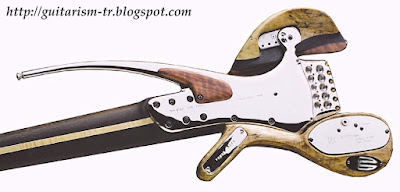Interview with Mike Spalt
Bill Bartolini and Mike Spalt
This interview is made by Koray Ergunay for his colomn named "Bass Guitar Dairies" on Sound Magazine and published on January 2011 issue! All rights reserved, do not use without permission!
How did you start building instruments and decided to launch Spalt Instruments?
I had always enjoyed tinkering
with guitars and basses, since I was a teenager. So when I needed to do something with my
hands while I was writing screenplays I started to build - at first it was just
a hobby, but over the space of a year or two it turned into my main
occupation. I simply ended up enjoying
this more than the writing. So now I had
to make a living at it. It took a little
longer to set up as a business and to begin working on instruments full-time.
How did you you come up with the idea for the Hybrid concept?
I wanted to reduce the instrument
to its essentials and also to create a modular design which would offer the
musician easily interchangeable parts. The interchangeable part did not happen
- it was before CNC machines were widely available and to make these parts by
hand would have been too difficult - There also was too little interest to
justify the expenditure and risk of a full-scale production. I might get back to it now that machining has
become simpler and the design has garnered some interest.
Can you describe the Hybrid models?
There are three basic models, a
4-string and a 5-string with conventional pickups (Matrix, Terminator) and
4,5,6-string models with the LightWave pickup system (Magma). The basic premise is the aluminum center
plate which anchors the neck and body parts.
However there really isn't a Standard version. All the basses I've made are single custom
constructions and each varies a little from the other since they are all
completely made by hand. I've used a lot of different wood varieties for the
body and neck parts as well as different pickup types and manufacturers. There are also variations in scale length,
fretted/fretless, fingerboard radius, bridges, headless, etc..
How did you you come up with the idea for the vViper sliding pickup?
I'm always looking for ways to do
interesting things. I had made a hybrid with
sliding pickups along a track in the body.
This seemed to work well for the aluminum center plate, but on a wood
body it wasn't really very practical. I
also noticed that the variation in tone achieved by moving the pickup seemed
greater on the high strings. The wiping
motions addresses this. It's the
simplest most trouble-free way of achieving a workable moving pickup.
How can you describe the sound of the vViper sliding pickup?
Steve Lawson tried the bass and
had a lot of fun quickly "wiping" the pickup back and forth. It created a kind of "wah-wah"
sound. It is different from the
conventional 2-pickup sound in that A) it has infinite variations, which can be
very subtle or rather dramatic, and B) there is no phase cancellation which
happens when 2 pickups are used simultaneously.
So it is a clear sound with good definition. It ranges from a P-Bass type tone in the forward
position through a Music Man to a Jazz Bridge type sound - it still does have
its own specific tone though.
How can you compare the sound of the Hybrid basses to that of the more
conventional basses? What are the adventaged or drawbacks of hybrid basses?
In general the sound is clearer -
a bit like a piano. The aluminum has a very
warm sound, so it's well suited to a bass.
The variations in woods and pickup systems etc. are just as great as
with conventional basses - so there are similarities to various conventional
designs. The advantages are a more ergonomic
shape (although you do have to get used to the difference), and definitely the
"WOW-factor". Drawbacks have
been (for me) the limited acceptance of anything outside the conventional realm
by musicians...
What are your plans for the future? Do you have any other interesting
concepts that you are working on?
I'm currently working on setting
up shop in Vienna, Austria - we are going to have a larger facility, with more
products coming down the pipe. The financial
crisis has hit the business just as everyone else and there is some catching up
to do. I'd like to introduce lines which
are more affordable and which can be sold through shops - at this time there is
no way I could sell a hybrid through a shop at a reasonable price and still be able
to make a living at it. That of course
severely limits availability. But with some streamlining and outsourcing of the
metal work I might be able to do that.
Quality has always been very important to me, so that remains at the top
of the requirements.
Thank you for your time. What would you like to say to the readers of
the Sound Magazine as your closing comments?
Try something a little different
- it might lead you down some interesting creative paths musically. There has always been an interaction between
instrument technology and the direction music has taken. There's still a lot of unexplored territory
to discover!

















